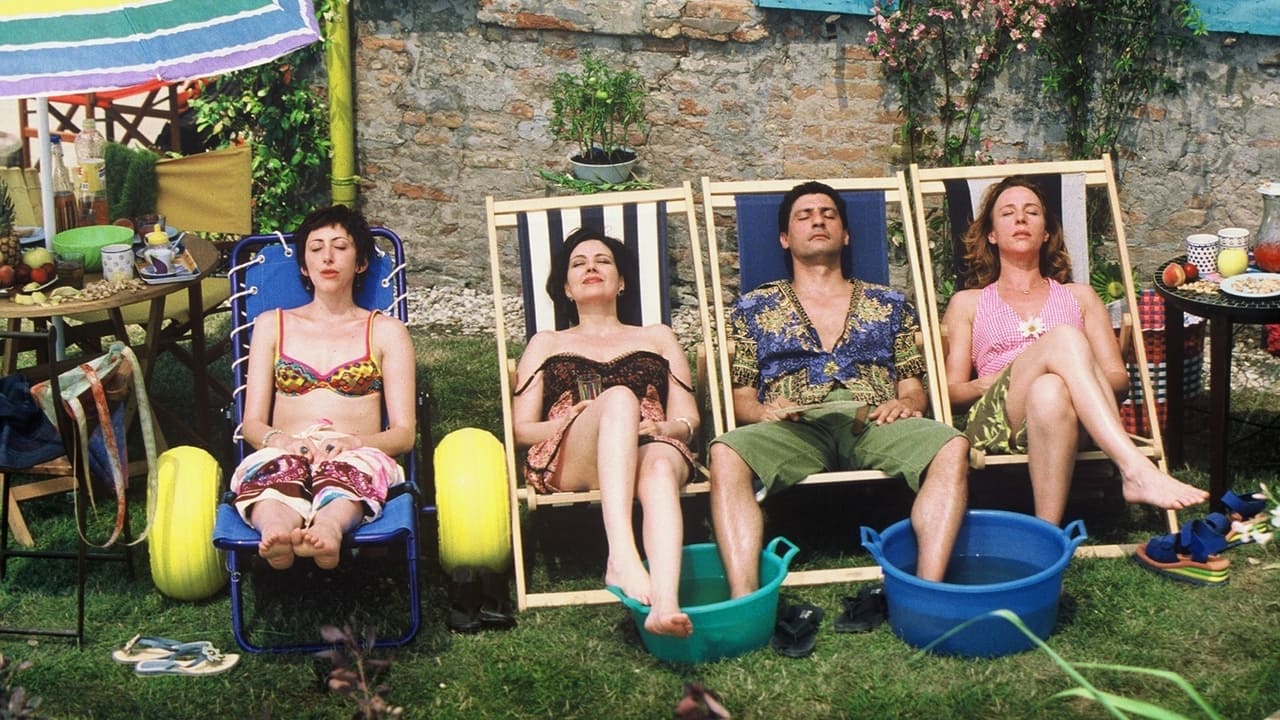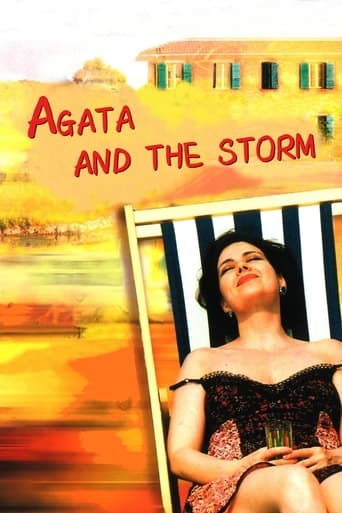



Load of rubbish!!
I like movies that are aware of what they are selling... without [any] greater aspirations than to make people laugh and that's it.
View MoreStrong acting helps the film overcome an uncertain premise and create characters that hold our attention absolutely.
View MoreThrough painfully honest and emotional moments, the movie becomes irresistibly relatable
View MoreIf this were the work of some unknown director it would have deserved my five or even six stars -- meaning this is not a really good film, underwritten and overly long, it contains even some elements of kitsch, but also has some good views, some decent acting and has its funny and even heartwarming moments. Not worth a purchase or rent but well visible once if you can catch it on TV. But this was made by Silvio Soldini and he had access the a decent budget, a good photographer and the talents of L. Maglietta, G. Battiston and some similarly gifted actors for the smaller roles. It is really sad, almost revolting to see how he did not make good use of all this!I recommend that you read the review by "opossumd from Italy" here, as he very well summarized the weaknesses of the casting, as well as the fewer pleasant surprises (Daria and Maria Libera). It is really embarrassing to see all the unbelievable staggering of Gustavo, as the actor is not good enough to compensate for the sloppy writing. (Unlike Battiston who does that successfully most of the time.) Gustavo is rather quick to give up the memory of the foster father who helped him to become a successful architect and embrace his worthless biological father, but we never get to know why. I kid you not: this motif is more chiseled in Kung Fu Panda 2! And his love affair is so unfounded and without chemistry, I could not believe that for a moment, although I tried hard as I'm a real sucker for love at first sight. This makes Major Kierkegaard one of the most superfluous and kitschy characters -- the other being the old Chinese naturopath. It is rather clichéd to have one in a movie, but certainly it can be used well, think of Woody Allen's "Alice". But this one is introduced, gives some pieces of ineffective advice, then he's simply forgotten at some point.And there is one point, after Agatha's confession to the wrong man and her consequent destruction of the electrical systems of both the car and the highway lighting (two rather good scenes) when it seems the dog ate the remaining parts of the script and the director also abandoned the project, telling the actors to carry on what they did before. From that on, Agatha only shows very out-of-place signs of happiness (even at a funeral) and the whole film falls apart.(Soldini is usually well aware of the fact that money doesn't grow on trees and even well-to-do people have financial problems sometimes. This is not important but can be felt in "Bread and Tulips", a very important motif in both "Come Undone" and "Days and Clouds". But in this one, Gustavo abandons his architect practice, Agatha the bookshop and Romeo's fashion business has always been a one-man show. But in the end the trout farm is still being built and the family still can afford to spend an awful lot on medical treatment. Good for them but frankly I prefer to be taken seriously as a viewer.)I do not agree fully with opossumd on one important point: he thinks Licia Maglietta was erroneously cast, "too plain, overage and overweight for the character." I'm convinced she could have done it very well, just not with this script and partner. Imagine Nico being not older than 17 (certainly not married, with an unloving mother, reading a lot and shy with girls of his age) and suddenly a lot of things would be in place: his attraction to a motherly figure, his strange style of courtship, and also Agatha's unnaturally strong reactions to a temptation that would be much more scandalous than "simple" adultery! Needless to say, making THAT film would have required a lot of courage. . .
View MoreThe constant interruption of everyone's cell phone while trying to carry on a live conversation was completely annoying. Letting landline phones ring ad nauseum, are there no answering machines in Italy? The plot was hard to follow at times because the scene cuts were awkward and flowed poorly. I was surprised how many sexual references and scenes were interspersed with actual dialogue. One reviewer mentioned that Americans would not understand all the infidelity issues covered in the film. They were correct, it was overdone and about as effective as the light bulbs burning out amidst Agata's moods.Since this film was nominated for many awards, I am disheartened to think that more recent productions present such low caliber of entertainment, has Italy lost it's touch? Fellini made you think, react, and surprised you, despite low production value. I have seen many foreign films and if this was my first, I would be very tempted to skip further soporific attempts. Hopefully, Bread and Tulips may redeem this effort.Overall recommend for eye candy handsome men, pastoral scenery, but you can get this in many other films. Just plain dumbed down fodder.
View MoreI thought Silvio Soldini's previous film, Blood and Tulips< was very good, so I thought I would give him another try.This film was nominated for eight David di Donatello awards (Italian Oscar). Sadly, it won none, but that doesn't take away from it's excellence.Licia Maglietta, Rosalba in Blood and Tulips, is Agata, a middle-aged book store owner. She starts and affair with Nico (Claudio Santamaria), who is 13 years younger. A cougar? (In Italy, a puma) Meanwhile, her brother Gustavo (Emilio Solfrizzi) finds out that he was the product of a one night stand, and has a brother, Romeo (Giuseppe Battiston). I have to say that Romeo is one flashy dresser.The characters mentioned and their partners go through the travails of life with humor and love and sadness, just as we ll do. It was a sweet picture.
View MoreAgata e la tempesta is an agreeable, though half-baked, surreal dream. Agata is a happy middle-aged bookshop owner living alone, who causes magnetic storms when she's excited (making bulbs, toasters, computers, traffic lights go pop). She has a daughter in Spain and a saturnine "brother", Gustavo, nearby, who is going through an identity crisis (he has discovered he is not related to her, his real brother being a Felliniesque travelling salesman in the rag trade, with a handicapped wife and a collection of one-night-stands). He is married to a celebrity tv psychologist who counsels people in shaky marriages and enacts her own advice at home. Agata herself feels attracted to a much younger married man who idolises her. There are several other characters, all of them pulling in different directions. Each of the characters would deserve his or her movie.This film has a number of serious flaws. Firstly, the duration - two hours - is too long for following the main thread of the inconclusive comedy plot. Secondly, It is miscast. Massironi (Ines, the psychologist - a great interpretation), is a wonderful comedienne with multifaceted charisma, who would have given extra depth to the protagonist Agata. Instead, this is played with insufficient conviction by Maglietta (whom I see far better cast as Ines), definitely too plain, overage and overweight for the character (who still walks around flimsily dressed, carelessly displaying her flabbiness. Is this really sexy?). Battiston (Romeo, travelling salesman in the rag trade), puts in an even more brilliant performance than in Bread and Tulips; he is unfortunately - and literally - sacrificed by a sloppy and shallow script. Solfrizzi (Gustavo, Agata's brother) is, at best, expressionless and his lines cliché. Santamaria, who plays the young lover, Nico, is almost laughable, with his stereotyped overacting. Which woman would keep a straight face at his courtship? Weather-beaten Jorgensen pulls off an unconvincing portrayal as the Nordic career woman infatuated with the sluggish Gustavo. Where's the spark? Two very pleasant discoveries are Volodi (playing Maria Libera, Agata's colleague), a very promising character actress reminiscent of Milena Vukotic at her best, and Lappo (Daria, Romeo's handicapped wife), funny and sweet, who may be following into the late Giulietta Masina's steps.I somehow miss the Silvio Soldini of Bread and Tulips, and hope to see him back in full colours in the future. Overall mark: C-
View More